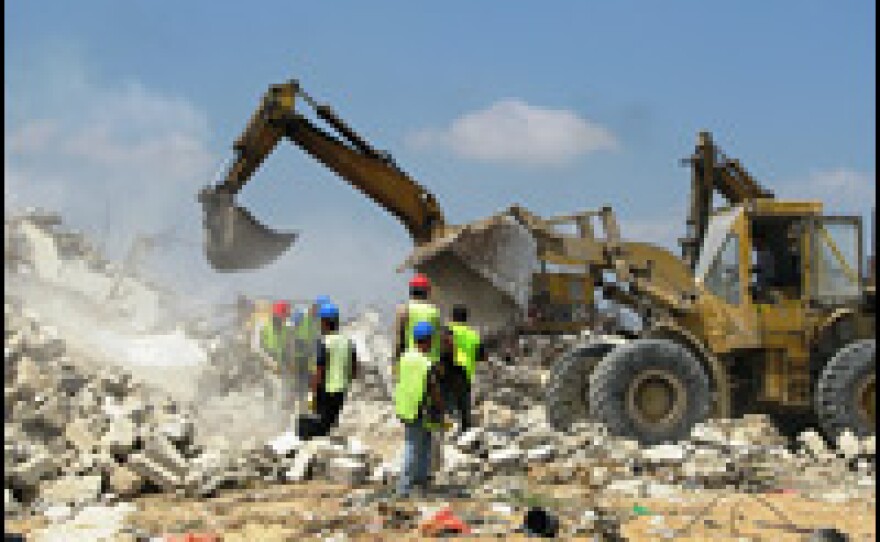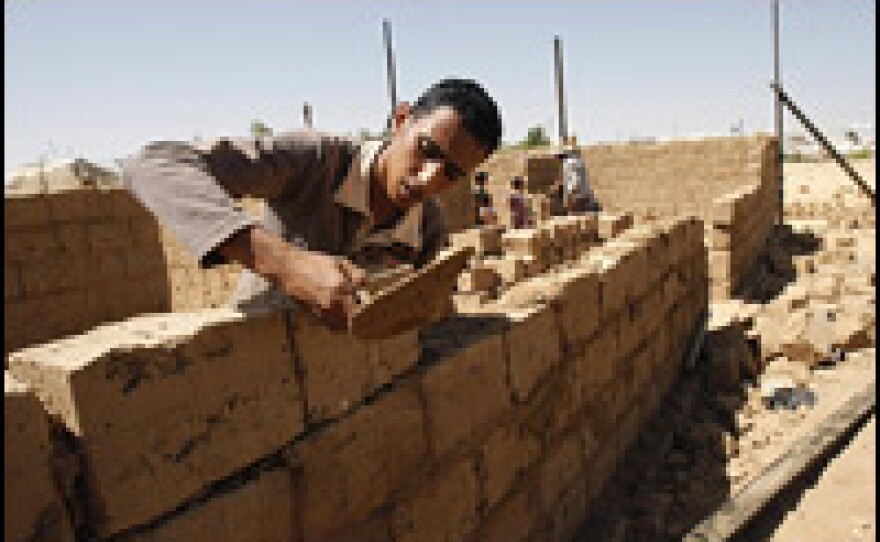

Six months after the Israeli assault on the Gaza Strip came to an end, the United Nations has launched a $12 million project to clear away the rubble of buildings destroyed by Israeli bombs, rockets, and artillery and mortar shells.
The project will take another year to complete, and so far there's no indication when actual reconstruction will start.
Israel, which launched the military operation in an effort to halt rocket attacks from Gaza into southern Israeli towns, continues to block cement, steel and other building materials from entering Gaza. The Israeli military maintains a security cordon around the Gaza Strip, saying its blockade is necessary to prevent materials from reaching militants inside the Palestinian territory.
Since Gazans emerged from their hiding places as Israeli forces withdrew in January, they've been waiting for the day when the outpouring of international sympathy and financial pledges will turn into something more concrete. They are still waiting.
Bulldozers Rolling
But the bulldozers have at last started to clear away the mountains of concrete, glass and steel that were once homes, offices and mosques.
On the edge of an industrial area near the village of Izbet Abed Rabo, northwest of Gaza City, bulldozers and front-end loaders begin the arduous process of shifting tons of rubble toward waiting trucks. In the background, a high-rise apartment building lies in a heap on the ground, with just the two reinforced sides of an elevator shaft jutting awkwardly up into the sky, like a naked man startled by a fallen shower curtain.
Jens Toyberg-Frandzen, the U.N. development project's special representative for the Palestinian territories, says the challenges are huge.
"We're talking about 600,000 tons of rubble that has to be removed, so it's a massive-scaled program. There is the risk of unexploded ordnance among some of the houses here. We have to make sure that people who are engaged in this have the adequate training. So there are a lot of activities that were necessary," he says.
By international aid standards, this project has moved along at a brisk pace. The U.N. spent the immediate aftermath of the war trying to see that some $21 million in emergency aid was distributed to homeless Gazans without being seen to benefit Hamas, which is considered a terrorist group by many donor countries.
Hamas, founded in the 1980s as an Islamic militant movement fighting Israel, took political control of Gaza after a surprise victory in Palestinian elections in early 2006. Mahmoud Abbas, president of the Palestinian Authority and a member of the rival Fatah party, dissolved Gaza's Hamas-led government and declared a state of emergency in 2007. Hamas took full control of the territory after fierce street fighting with Fatah militias.
Following Israel's military operation in January, world leaders pledged billions of dollars in reconstruction aid for Gaza, but that didn't come until March. The rubble-clearing is now under way.
Waiting For Reconstruction
While aid groups may be pleased with their efforts, Gazans contemplating a long, hot summer staring at the pulverized remains of their property are understandably unimpressed.
Not far from the rubble-clearing effort, a line of men wait semi-patiently while workers from a Turkish aid agency struggle to accommodate the demand for their food and aid packages.
Eyad Mohammed eyes the piles of rubble surrounding him and shrugs.
"Yes, of course, they didn't do and they will not do anything now because of the siege. All those houses cannot be rebuilt because of the siege," he says.
Mohammed and many other people here believe the Israeli policy of keeping building materials out of Gaza is not only cruel, but also largely pointless. After all, they say, Hamas has the power to get at least some cement on the black market, smuggled in from Egypt, so it is the innocent who suffer the most.
But Mohammed also blames Hamas and Fatah for fighting each other when they should be looking after the people. He works for a Fatah-run government ministry and is still getting paid, for now.
"Yes, I am still receiving [payment], but in any month, any moment, I am afraid they will cut it ... The political situation is totally affecting the economic situation here. The situation is very depressing, nothing is stable. You don't feel confidence in this country, you don't feel safe in it," he says.
Copyright 2022 NPR. To see more, visit https://www.npr.org. 9(MDAzMjM2NDYzMDEyMzc1Njk5NjAxNzY3OQ001))







